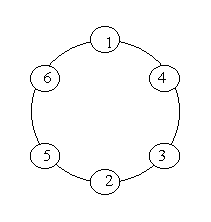HDOJ Prime Ring Problem (深度优先搜索)
Prime Ring Problem
Time Limit: 4000/2000 MS (Java/Others) Memory Limit: 65536/32768 K (Java/Others)Total Submission(s): 11488 Accepted Submission(s): 5194
Problem Description
A ring is compose of n circles as shown in diagram. Put natural number 1, 2, ..., n into each circle separately, and the sum of numbers in two adjacent circles should be a prime.
Note: the number of first circle should always be 1.

Note: the number of first circle should always be 1.

Input
n (0 < n < 20).
Output
The output format is shown as sample below. Each row represents a series of circle numbers in the ring beginning from 1 clockwisely and anticlockwisely. The order of numbers must satisfy the above requirements. Print solutions in lexicographical order.
You are to write a program that completes above process.
Print a blank line after each case.
You are to write a program that completes above process.
Print a blank line after each case.
Sample Input
6 8
Sample Output
Case 1: 1 4 3 2 5 6 1 6 5 2 3 4 Case 2: 1 2 3 8 5 6 7 4 1 2 5 8 3 4 7 6 1 4 7 6 5 8 3 2 1 6 7 4 3 8 5 2
Source
Asia 1996, Shanghai (Mainland China)
#include <iostream>
#include <cstring>
using namespace std;
int n,j,k=1,visit[20],a[20]={1};
int prime[38]={0,0,1,1,0,1,0,1,0,0,
0,1,0,1,0,0,0,1,0,1,
0,0,0,1,0,0,0,0,0,1,
0,1,0,0,0,0,0,1};
void DFS(int m)
{
if(m==n && prime[1+a[n-1]])
{
for(int i=0;i<n-1;i++)
cout<<a[i]<<" ";
cout<<a[n-1]<<endl;
}
else
{
for(int i=2;i<=n;i++)
{
if(prime[i+a[m-1]] && !visit[i])
{
a[m]=i;
visit[i]=1;
DFS(m+1);
visit[i]=0;
}
}
}
}
int main()
{
while(cin>>n)
{
memset(visit,0,sizeof(visit));
cout<<"Case "<<k++<<":"<<endl;
DFS(1);
cout<<endl;
}
return 0;
}